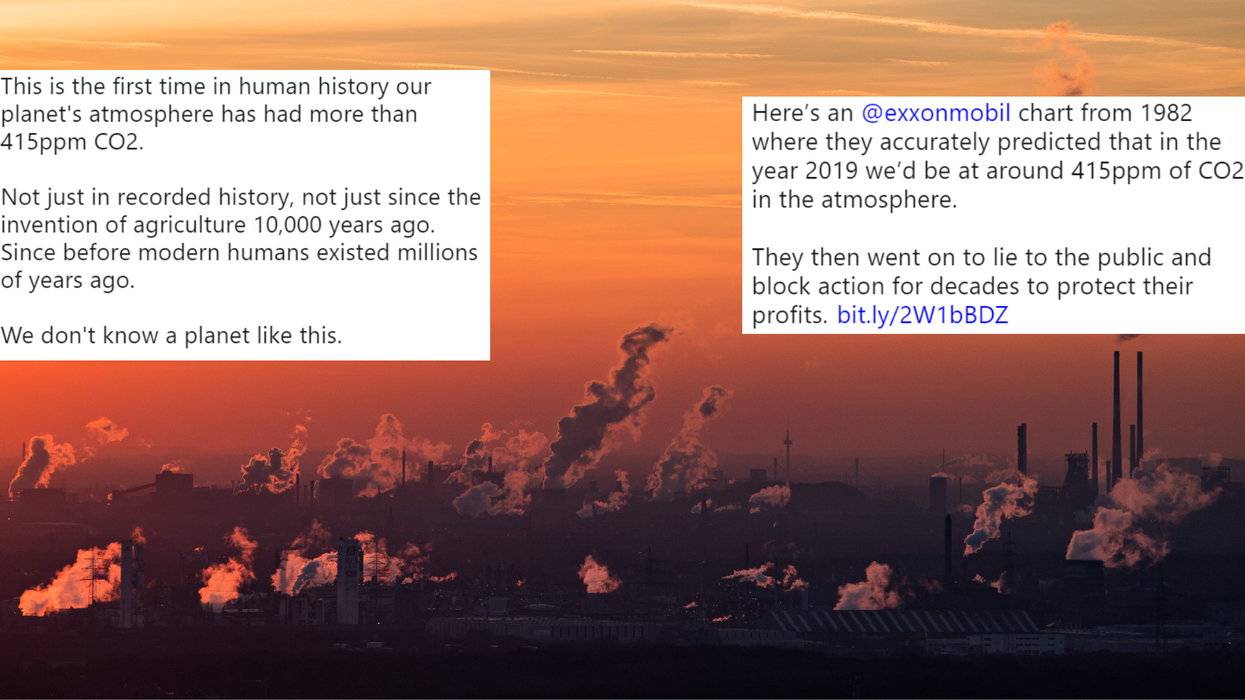News
Andy Gregory
May 15, 2019

Lukas Schulze/Getty Images/Twitter
Climate is fast becoming the only sub-section of news to rival sport for its quantity of record-breaking or unprecedented events.
Whether it’s our oceans continuing to have their warmest year on record, year after year, or marine life travelling hundreds of miles north than ever recorded on strange ocean currents, there’s plenty to take your pick from.
On Saturday, the level of carbon dioxide in the Earth’s atmosphere reached its highest level in human history.
Scientists at the Mauna Loa Observatory in Hawaii, which has measured atmospheric CO2 levels in parts per million (ppm) since 1958, recorded its first ever daily baseline of 415.26ppm – compared to 313ppm in 1953.
Although the rise is caused mainly by fossil fuel emissions, an oil company predicted this record-breaking event as far back as 1982.
Leaked documents show scientists at Exxon Mobil predicted we would reach 415ppm in exactly this time-frame, and that doing so was likely to warm the planet by 2C above pre-industrial levels by 2050.
The scientists concluded:
Mitigation of the 'greenhouse effect' would require major reductions in fossil fuel combustion.
Despite the findings, they continued to drill for oil and funded a concerted effort to counter the scientific consensus including taking out weekly advertorials in The New York Times between 1972 and 2001 at a cost of about $31,000 (£24,232) per article. According to Harvard experts the articles contained “several instances of explicit factual misrepresentation” despite reaching a readership of millions.
The 1982 report was first leaked in 2015 and published by Inside Climate News, while similar documents relating to Shell also emerged last year.
Shell's report from 1988 said that changes to sea levels and weather would be “larger than any that have occurred over the past 12,000 years”.
ExxonMobil were not available for comment. Their website states:
“We unequivocally reject allegations that ExxonMobil suppressed climate change research contained in media reports that are inaccurate distortions of ExxonMobil’s nearly 40-year history of climate research.
“We understand that climate risks are real. The company has continuously, publicly and openly researched and discussed the risks of climate change, carbon life cycle analysis and emissions reductions.”
On 1 May the UK government declared a "climate emergency" in response to the efforts of campaigners and schoolchildren across the country.
The motion was introduced by Jeremy Corbyn, who said:
We pledge to work as closely as possible with countries that are serious about ending the climate catastrophe and make clear to US president Donald Trump that he cannot ignore international agreements and action on the climate crisis.
More: Mike Pompeo praised climate change for opening up Arctic trade routes
More: This author's point about climate change and Brexit is eye-wateringly accurate
Top 100
The Conversation (0)













